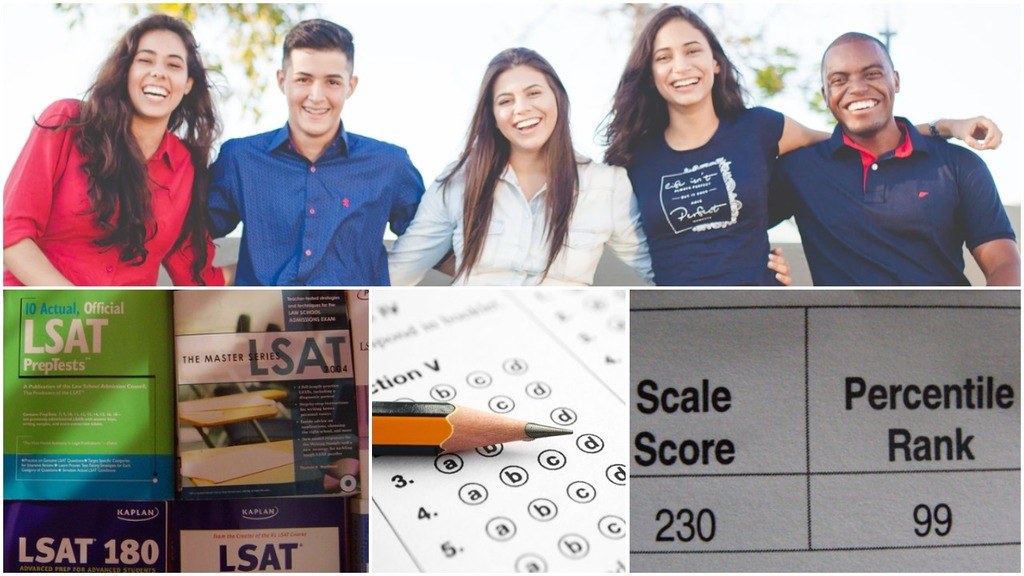LSAT Scores and Percentiles | Understand Your Target Scoring and How It Stacks Up Against the Other Applicants
Many people know that pursuing a law degree requires that you take the Law School Admission Test (LSAT) and get accepted to a law school, but few people know how to read their LSAT scores and understand what their potential schools are looking for in students that take the test. Below you will find the information you need to understand those scores and if you are interested in increasing your scores check out these top-rated LSAT prep books we reviewed.
Good LSAT Scores for Law School
I admit I was a little confused the first time I saw LSAT scores, but once you understand what a good score is and the LSAT scoring scale, it gives you the perspective you need to figure out how hard is the LSAT and, “what is a good LSAT score?” The LSAT score range is from a minimum of 120 to a max LSAT score of 180. A good LSAT score is entirely subjective and dependent on what school you are trying to apply to. Since most students struggle with LSAT Reading Comprehension, we strongly recommend that you read our guide to this section of the test.
If you want a good chance of getting into your school of choice then you should attempt to get a score that will match or exceed what your school of choice’s average LSAT scores are for their students. The average LSAT score for Harvard is a score of 172, which means if you want to boost your chances of getting in, then you should attempt to get a 172 or higher on your LSAT.
How Important are LSAT Scores?
Why should you care about your LSAT scores? They are the most important part of your application to a law school. When you are being considered for admission, the first thing that people are going to look at is your LSAT score, which means it is extremely important. I have often heard that first impressions are everything and your LSAT score is your first impression with anyone that is going to consider you for admission.
Average LSAT Score
But what is the average LSAT score? The average LSAT score is around 152 which translates to about 60 out of 101 questions answered correctly. Truly exceptional schools are going to be looking for students in the 170 and above range, which means it is important to score as highly as you possibly can manage on your LSAT if you want to be accepted to a good school. A score of 170 roughly translates to about 90 out of 101 questions answered correctly.
LSAT Percentiles
I found this a bit confusing at first, but it is actually very simple. Your LSAT percentile rank is a representation of how well you did on the test in comparison to other people that also took it. The higher you score on the test, the higher your LSAT score percentiles will be. If you have a percentile of 86% then you scored better than 86% of your fellow test takers and only 14% of them scored higher than you.
LSAT Scoring Chart
If you are looking at an LSAT score chart you will notice that most of them will show your rank or score based on how many questions you missed. This is because it is likely that you answered more correctly than you did incorrectly, which means it is easier to count the ones you missed to determine your score on an LSAT percentiles chart.
This means that once you determine the score you need to get, you can translate that score into exactly how many questions you are allowed to get wrong on your test and thus have a good understanding of exactly how well you have to do to get the score you want. I find this to be a much easier frame of reference when considering a test.
LSAT Score Conversion
When your score is calculated it is based on how many questions you answered correctly on the test. If you answer 90 questions correctly, then you got a 90/101, this is known as your LSAT raw score. This score then undergoes LSAT raw score conversion to be transformed into a scaled score which is what people will most likely look for on your results. 90 translates to about 171 out of 180.
This scaled score is used to determine your LSAT score percentiles, which determines how you stack up against other people that have taken the same test you have. With a score of 171, your LSAT percentiles will be about 98.03% which means you scored higher than all but 1.97% of the people that took the same test you did.

LSAT Scoring and Percentiles for Top 10 Law Schools
Yale is the number 1 ranked law school and the Yale LSAT score average is 173 which means you should shoot for at least a 173 on your LSAT if you want a good chance of being accepted there.
Sometimes they will also use your LSAT percentile scores to determine whether or not they should accept you. Below you will find a list of the top 10 law schools and their average scaled scores.
Rank | School Name | Scaled Score Average | Percentile Rank |
1 | Yale University | 173 | 98.97% |
2 | Stanford University | 171 | 98.03% |
3 | Harvard University | 172 | 98.6% |
4 | University of Chicago | 170 | 97.37% |
5 | Columbia University | 172 | 98.6% |
6 | New York University | 169 | 96.67% |
7 | University of Pennsylvania | 167 | 94.48% |
8 | University of Virginia | 167 | 94.48% |
9 | University of Michigan | 168 | 95.77% |
10 | Duke University | 168 | 95.77% |
My LSAT Score Report
The LSAT score report you receive from the LSAC will show your 3 different scores. It is usually sent to you via email, or it may arrive via physical postage if you do not have an account on their website with an attached email.
When Will I Get My Score and What’s In It?
You may be wondering, “how long to get LSAT scores” after you have taken the test. It usually takes anywhere from 3 to 4 weeks to receive your LSAT score report and it will include your LSAT raw score, the LSAT raw score conversion to your scaled score, and your LSAT percentile ranking. You may be wondering, “how long do LSAT scores last?” They last 5 years. If you have taken multiple tests then it will show your average over the past 5 years which will be used in place of your highest score in most, but not all, cases.
Hope this score breakdown helps and now get down to studying and good luck!


